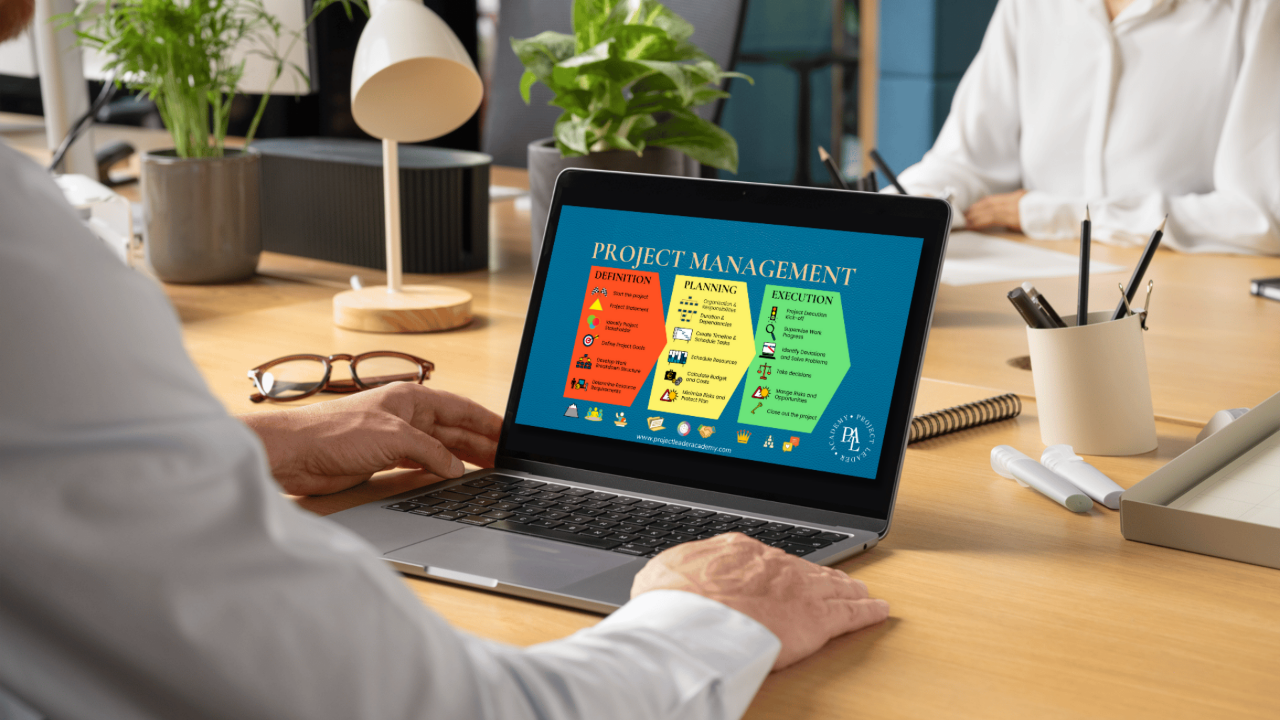Top 10 Communication Skills of Successful Leaders

We cannot run a business or a project without communicating with other people. Did you know that not communicating is a form of communication?
Being a leader means we constantly communicate with people who are clients, team members, suppliers, government representatives, employees of .financing institutions, board members, and other stakeholders.
We all understand that our business results, project acceptance, the project success depends on our ability to communicate with other people.
The better we master these communication skills, the larger-scale project and business we can lead. So let's dive in! Here are the top 10 communication skills leaders and project managers need to master:
1. Listening skills
We have 2 ears and one mouth. This was a picture I was drawing n the flip chart in my training. I love talking but in my leadership journey I learned that speaking is silver and listening is gold:
- active listening so we understand what our clients really want, what our experts recommend, and what are our stakeholder's requirements. what does our team think?
- empathic listening: this helps us to build relationships with all the people, that are more likely to support us if they feel heard.
- Verbal Phrases you can try today to show compassion are
- That sound like,
- that looks like
- That is interesting
- Nonverbal cues we teach in our training include how to manage eye contact online and with others.
2. Questioning skills
Did you know that effective leading means asking effective questions?
Questions can encourage the thinking process and lead to conclusions much better than persuasive arguments and reduce the resistance to our idea by up to 80%.
In our training programs, we teach very specific sets of questions for different situations. Here are some of the typical leadership situations that we can lead with specific questions:
Building rapport with potential clients, selling an idea or proposal with SPIN questions, handling objections, negotiating the price without giving discounts, moderating team meetings so that everyone is engaged, finding the root cause of a problem, managing crisis situations, interviewing new team members, coaching suppliers and team members, facilitating group decision making and more...
The first step is to teach the difference between open and closed questions.
Open-ended questions are designed to gather new information
- What?
- Why?
- How?
- when?
- How much?
Closed questions are designed to confirm information
- Do you agree that...?
- Is it right that...?
Questioning skills are important and if you want to get better results ask better questions to your team, your clients, and yourself.
3. Delegation skills
Do you outsource or do you have a team? In projects, in business, and in life you can’t do everything yourself. Imagine you are the perfect expert and learned all the skills but the day has finally 24 hours for all of us. So if you have a big vision, want to build a business or follow a passion project, and want to spend more time with your family and friends you finally need to learn to delegate.
I remember the lesson I go to give my children a more clear instruction:
Old me:
“I really would appreciate that after playing on the playground you have dirty hands and that is dangerous so please take care of cleaning your hands…...
New me:
( Listen) Go to the bathroom and wash your hand with sope! Please!
In our leadership training, we practice role-play sessions and we have so much fun showing the “ Boss” how easy we can misunderstand the instructions and how to delegate tasks instead 
Here is just a quick Tip to implement today:
try to be more specific and keep your instructions short and concise,
Are you worried that delegating will take longer than just doing the work yourself? Are you nervous about letting go? If you want to grow to be a leader in business or life start trusting people, suppliers, coworkers, family, and your children. Hire an assistant and practice delegating so that you become a pro.
4. Negotiation skills
We negotiate every day and we get do not get what we want but what is able to negotiate.
Who do we negotiate with? Here are some of my negotiation partners:
I negotiate with clients, business partners, authorities, suppliers, children, landlords, authorities …
I agree sometimes we just want to command and don't spend any energy. However, negotiation is the art of achieving results and building relationships.
This is why I love the tactics I learned in 20 years of teaching negotiation skills to executives and engineers. This Is why leveling negotiation skills is part of our Program Project Leader Business Class.
How to create win-win deals,
How to reach a compromise
Understanding your negotiation style and what is the negation style what of your counterpart helps you to choose simple but powerful and best negotiation strategies and tactics.
I strongly believe in the win-win deal but it takes always two to dance the tango.
In our leadership programs we teach
- 5 powerful negotiating strategies and how to move toward a win-win.
- how to reach reliable agreements and commitment
- what to do In case you get stuck and ho to get past "NO"
- how to maintain the relationship over reaching a goals
Any negotiation is always a compromise between achieving results and managing relationships. Master this art and you get what you want in life and in your projects.
5. Public Speaking skills
Being a project manager and leader public speaking is a skill we need to become better at all the time. Here are some specific project management situations we can benefit from the Art of public speaking.
- Pitch your big idea
- Present your project proposal
- Present your r plan to your team, and stakeholders
- Present project status and results
- Present final data and timelines
- Teach a concept online
I believe we all underestimate how powerful our communication style can impact the outcome of a project.
Being a leader means being able to communicate with all kinds of people, and stakeholders who have different ways of perceiving and processing information.
Do you know your SCIL communication performance profile that measures your charisma and 16 communication frequencies? The SCIL profile shows you exactly what you may focus on first so that your performance coach can help you within the first coaching session to immediately enhance your speaking impact.
6. Sales conversation Skills
Selling is serving. So how do you persuade someone that your solution can really help?
Here are some key skills we teach our project leaders to be more confident in the following situations:
Check for yourself:
- How successful are you communicating how your project is helping people?
- How well do you communicate the value of the project beyond facts?
- How do you create Irresistible offers to team members, suppliers, clients, and investors?
- How do you sell yourself and your project in a discovery call?
- How do you handle sales calls with investors?
- How well do you handle objections?
- How do you close a deal?
Sure sales need as well planning and systems on how to follow up, what software we like to use, etc but 80% of the equation is the ability to hold a sales conversation professionally. That is why we spend a lot of time with our students practicing sales conversations in Roleplay.
7. Meeting facilitation skills
There are plenty of facilitation methods varying from simple brainstorming to very complex strategic planning discussions and open space. I love being in the boardroom and feeling the creative energy of the people. Today we recreated these meetings with one or a combination of digital tools.
Here are some typical meetings that have a very specific flow and if you follow that you can be the youngest person in the room and get great results.
- Team feedback meeting
- Situation appraisal meeting
- Decision-Making meeting
- Problem Solving meeting
- Risk discussion meeting
- Opportunity and Innovation Meeting
- Project Start-Up Meeting
Meetings with the intention help to engage, stakeholder supplier and clients and most foremost motivate your team and get you business results you never dreamed of.
8. Conflict Management skills
Typical conflicts in projects and the project environment are:
1. Conflicts over ard facts like:
- The project goals, the scope
- The quality and release
- The scope of deliverables,
- The time schedules,
- Project costs and budgets,
- Business processes
- Roles responsibilities
- Resources and supplies,
2. People conflicts like:
- The 4 DSC types have different interests and values. and Egos, Personal are not aware of programs that trigger unwanted emotions
- Lack of trust and respect between team members
- Lack of motivation
3. Misunderstandings like:
- People make assumptions and ignore facts or do not understand what was meant by the email, chat, or brief.
- People hear you yet they do not understand you the way that you would love.
- Lack of professional feedback culture
- the courage to reach out to each other to clarify an issue
- the ability to respect one another’s opinions and ways of working
How to manage conflicts successfully is a very important leadership skill we teach in our leadership programs. Here are some exercises we practice in our roleplay:
- Detect signs of a conflict so that we can mitigate the conflict at an early stage
- How to mediate conflicts between team members,
- How to handle internal conflicts with yourself
- How to manage conflicts with your boss, suppliers, stakeholders
Conflicts are chances and we can learn to deescalate by becoming professionals in seeing opportunities rather than problems in a conflict.
9. Coaching Skills
Successful leaders know exactly the difference between mentoring, teaching, coaching, delegating, and giving feedback.
Especially for high-performing teams, it is important that leaders use high-level coaching skills to empower the team members.
If you have been reading the article about the four stages of team development you remember that in the performing stage the leader is leading by acting as a coach.
In our program, in the project leader business class we teach our System of Solution-oriented can be coaching focused on empowering suppliers and team members to find solutions for problems themselves.
10. Online visibility skills
How do you lead in this new world where we travel and work from wherever. Being online visible is much more than just hopping on a Zoom call. We can learn so much from Hollywood bout cameras and light sand branding.
Being visible on, social media to influence and attract stakeholders requires another skill set and both of these require a lot of planning and teamwork.
If you want to start with a confidential showing on camera so be assured that in our programs we teach you.
Being present and showing up on camera and on social media is key to building relationships online.
These skills have been part of our Leadership Experience Programs for the past 20 years and have helped over 6000 executives and engineers to become confident leaders. These skills are part of the Project Leader online experience " The Confident Project Leader" and the "Project Leader Business Class!
Conclusion:
Improve your communication skills so that you become a better leader, negotiator, conflict resolution expert and influencer.
Communication is what helps you to motivate people and makes the do the work, get results, pay you in time, building meaningful connections and brings joy in life.
Project Planning is queen and Project Communication is King.
Up-level your Communication effectiveness with our Communication Performance Accelerator
Assess your Communication skill fore free . Click here






